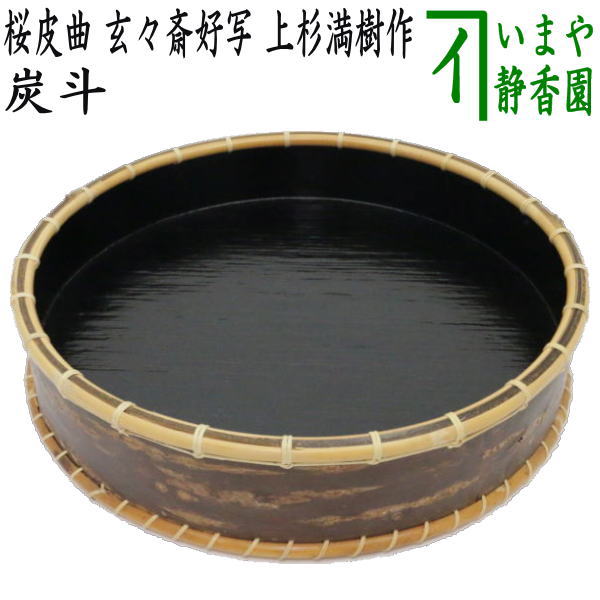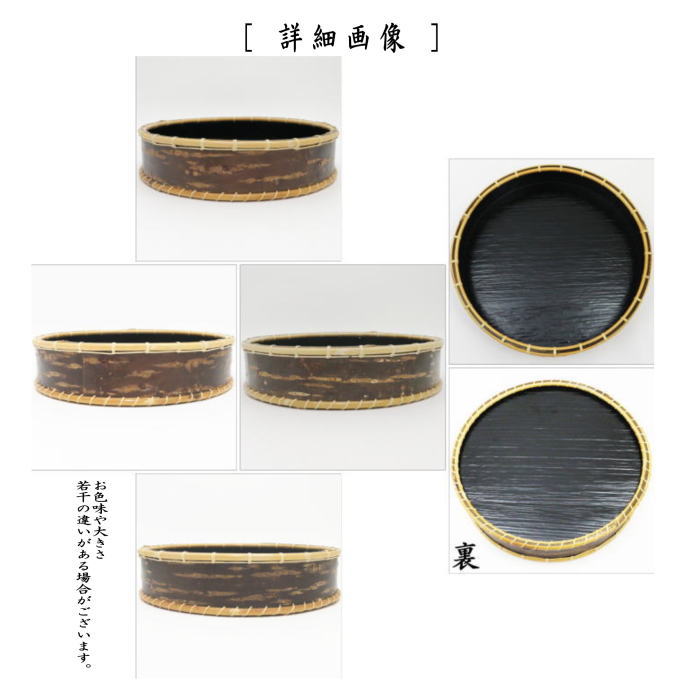1
/
of
2
[Tea utensils/tea ceremony tools, charcoal tools] Charcoal container (charcoal holder) Sakurakawa curved, a copy of Gengensai's favorite, made by Uesugi Mitsuki, made in Japan
[Tea utensils/tea ceremony tools, charcoal tools] Charcoal container (charcoal holder) Sakurakawa curved, a copy of Gengensai's favorite, made by Uesugi Mitsuki, made in Japan
Product Code: sumitori-168
Regular price
70,950 円
Regular price
Sale price
70,950 円
Unit price
/
per
Tax included.
Shipping calculated at checkout.
Couldn't load pickup availability
● Sumitori (charcoal container) is a container used during the sumidemae ceremony, in which the host places charcoal into the hearth or brazier in front of the guests. It is then carried around the room with charcoal inside, along with an incense holder, feather broom, kettle holder, ring, and fire tongs.
It is also written as sumitori and called Ufu.
Most of them are used in the form of baskets or other assembled items that have been lined and lacquered.
There are Chinese and Japanese items.
Karamono charcoal baskets are baskets woven from materials such as wisteria and bamboo, and many of them are extremely intricately woven with variations in each part. Some are made from a mix of wisteria and bamboo, or woven with palm bark.
In addition to baskets, Chinese charcoal containers also include lacquerware, containers filled with blue shells, and golden horses.
Japanese charcoal containers are made from materials such as rattan, bamboo, wisteria vines, and lotus stems, and their weaving style is more chunky than those of Chinese containers.
In addition to baskets, Japanese charcoal containers include gourds, ikkanbari, lacquerware, bentwood, and joinery, and sometimes sakuzubako (paper waste boxes), chayorikkago (tea selection baskets), sangesara (flower scattering plates), mi (winnowing baskets), and horoku (fireplaces).
Types of charcoal containers include the "sairou" (vegetable basket), "fukube sumitori" (gourd charcoal container), "kamioshiki" (sacred tray), "sumidai" (charcoal stand), and "hako sumitori" (box charcoal container).
Rikyu-style charcoal containers include oil bamboo, scale baskets, Daruma dolls, chrysanthemum-mounted, high-rimmed charcoal containers, wooden charcoal stands, gourds, and mulberry box charcoal containers for use in the water room.
Among the items by Sotan are the gourd handle, the Ikkan-hime God Orishiki (large), and the Kuzu bucket.
Size: Approx. diameter 28 x height 6.6 cm
Material: Cherry bark
Made in Japan
Author: 2nd Uesugi Miki
----------
[2nd Generation (real name Mitsuru)]
Born in 1916
Since its establishment in 1974, he has been a director of the Kyoto Prefecture Lacquerware Crafts Association.
1975: Awarded the Excellence Award at the 2nd Traditional Craftsmanship Competition
1977: Awarded the Kyoto Prefecture Traditional Industry Outstanding Technician Award (Takumikai: Member)
1981-1985: Received the Governor's Award and the Mayor's Award
In 1984, he was certified as a traditional craftsman.
1999: Vice-chairman of the Kyoto Prefecture Lacquerware Crafts Association
January 1990: National Traditional Crafts Exhibition: Chairman's Award (Gold Award)
Heisei 02 April 1990: Awarded the Order of the Paulownia Leaves, 7th Class
1991 Director's Award
----------
Box: Wooden box
It is also written as sumitori and called Ufu.
Most of them are used in the form of baskets or other assembled items that have been lined and lacquered.
There are Chinese and Japanese items.
Karamono charcoal baskets are baskets woven from materials such as wisteria and bamboo, and many of them are extremely intricately woven with variations in each part. Some are made from a mix of wisteria and bamboo, or woven with palm bark.
In addition to baskets, Chinese charcoal containers also include lacquerware, containers filled with blue shells, and golden horses.
Japanese charcoal containers are made from materials such as rattan, bamboo, wisteria vines, and lotus stems, and their weaving style is more chunky than those of Chinese containers.
In addition to baskets, Japanese charcoal containers include gourds, ikkanbari, lacquerware, bentwood, and joinery, and sometimes sakuzubako (paper waste boxes), chayorikkago (tea selection baskets), sangesara (flower scattering plates), mi (winnowing baskets), and horoku (fireplaces).
Types of charcoal containers include the "sairou" (vegetable basket), "fukube sumitori" (gourd charcoal container), "kamioshiki" (sacred tray), "sumidai" (charcoal stand), and "hako sumitori" (box charcoal container).
Rikyu-style charcoal containers include oil bamboo, scale baskets, Daruma dolls, chrysanthemum-mounted, high-rimmed charcoal containers, wooden charcoal stands, gourds, and mulberry box charcoal containers for use in the water room.
Among the items by Sotan are the gourd handle, the Ikkan-hime God Orishiki (large), and the Kuzu bucket.
Size: Approx. diameter 28 x height 6.6 cm
Material: Cherry bark
Made in Japan
Author: 2nd Uesugi Miki
----------
[2nd Generation (real name Mitsuru)]
Born in 1916
Since its establishment in 1974, he has been a director of the Kyoto Prefecture Lacquerware Crafts Association.
1975: Awarded the Excellence Award at the 2nd Traditional Craftsmanship Competition
1977: Awarded the Kyoto Prefecture Traditional Industry Outstanding Technician Award (Takumikai: Member)
1981-1985: Received the Governor's Award and the Mayor's Award
In 1984, he was certified as a traditional craftsman.
1999: Vice-chairman of the Kyoto Prefecture Lacquerware Crafts Association
January 1990: National Traditional Crafts Exhibition: Chairman's Award (Gold Award)
Heisei 02 April 1990: Awarded the Order of the Paulownia Leaves, 7th Class
1991 Director's Award
----------
Box: Wooden box
[About paid individual packaging]
If you would like individual packaging (charges apply), click View Cart, check "I would like individual packaging", and then add the desired quantity to "Quantity".
*The following products are not eligible for individual packaging. If you would like to package the folding fan or colored paper, we will provide a paid box or bag for each.
- Mail delivery products
- Folding fan (paid box available/no packaging)
- Colored paper (paid bag available/no packaging)
- Zodiac theme related products
【Related Category】
Share
![[Tea utensils/tea ceremony tools, charcoal tools] Charcoal container (charcoal holder) Sakurakawa curved, a copy of Gengensai's favorite, made by Uesugi Mitsuki, made in Japan](http://imaya.co.jp/cdn/shop/products/sumitori-168_4.jpg?v=1709094639&width=1445)
![[Tea utensils/tea ceremony tools, charcoal tools] Charcoal container (charcoal holder) Sakurakawa curved, a copy of Gengensai's favorite, made by Uesugi Mitsuki, made in Japan](http://imaya.co.jp/cdn/shop/products/sumitori-168_5.jpg?v=1709094639&width=1445)






















